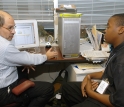|

Press Release 04-147
NSF Mentors Show Area Students with Disabilities Paths Toward Science and Engineering Careers


Taking a lunch break from activities at NSF as part of Disability Mentoring Day, sponsored by th ...
Credit and Larger Version |
November 3, 2004
Arlington, Va.—Gail Altieri, 17, a junior at PaTTAN (Pennsylvania Training and Technical Assistance Network) already has ideas for a career in meteorology, and when asked, she will gladly acknowledge that being on the Weather Channel is not beyond her realm of possibilities.
Altieri and three other students visited the National Science Foundation (NSF) on October 20 as part of Disability Mentoring Day, sponsored by American Association of People with Disabilities (AAPD) in partnership with the U.S. Department of Labor's Office of Disability Employment Policy and several private companies. The annual event is commemorated during the third week in October at various locations around the country to promote career development for students and job seekers with disabilities. Participants are paired with mentors at various government agencies and "shadow" the professionals for several hours to learn about the range of jobs and career opportunities. Altieri's NSF mentor was Lynda Carlson, director of the Division of Science Resources Statistics.
Stephen Steinbach, 16, a junior at the Kingsbury Day School in Washington, D.C., shadowed Joseph Burt, NSF's director of Human Resource Management. Burt introduced Steinbach to several human resource-related career areas and activities, such as NSF's new payroll and personnel system, fire and emergency response team responsibilities. Steinbach even listened in on labor relations discussions. He then met with Anthony Arnolie, NSF's director of the Office of Information and Resource Management, who is responsible for human resources, administrative services, information dissemination and security, and other resource management activities.
Rachelle Jackson, 15, a sophomore at Accotink Academy In Springfield, Va., visited with Mary Clutter, NSF's assistant director for biological sciences, and with science assistants from several divisions. Jackson became interested in wildlife conservation during a one-year stay in Kenya. Now, she wants to major in biology at Howard University. One of the directorate's visiting scientists, a biology faculty member at Howard University, discussed academic goals with Jackson.
Devin Walker, a Yorktown High School freshman in Arlington, Va., spent his day with Leland Scott, information dissemination branch chief in NSF's Division of Administrative Services. Walker, whose interests include photography and image-editing software, got a close look at the use of Web programming and website creation tools Scott's staff uses to develop and maintain pages for NSF.
The Division of Human Resource Management (HRM) led NSF's participation in Disability Mentoring Day. The Office of Equal Opportunity Programs coordinated the overall event as part of its role in hosting National Disability Employment Awareness Month, held during October.
Meanwhile, HRM also provided its own support for the activities, staffing an exhibit at the Department of Labor about NSF career field and intern opportunities.
Coordinators for Disability Mentoring Day say that there are mutual benefits for students, employment-seekers and participating organizations. Student, for example, learn to connect school and work, get a chance to target and improve career skills, and to make valuable first contacts for future internships or career opportunities. Participating organizations meet potential recruits and develop a greater understanding about the capabilities of individuals with disabilities, which in turn engenders lasting relationships with disability community leaders.
-NSF-
For more information, see: http://www.dmd-aapd.org

Media Contacts
Bill Noxon, NSF (703) 292-7750 wnoxon@nsf.gov
Program Contacts
Consuelo Roberts, NSF (703) 292-7325 croberts@nsf.gov

The National Science Foundation (NSF) is an independent federal agency that supports fundamental research and education across all fields of science and engineering. In fiscal year (FY) 2009, its budget is $9.5 billion, which includes $3.0 billion provided through the American Recovery and Reinvestment Act. NSF funds reach all 50 states through grants to over 1,900 universities and institutions. Each year, NSF receives about 44,400 competitive requests for funding, and makes over 11,500 new funding awards. NSF also awards over $400 million in professional and service contracts yearly.
 Get News Updates by Email Get News Updates by Email
Useful NSF Web Sites:
NSF Home Page: http://www.nsf.gov
NSF News: http://www.nsf.gov/news/
For the News Media: http://www.nsf.gov/news/newsroom.jsp
Science and Engineering Statistics: http://www.nsf.gov/statistics/
Awards Searches: http://www.nsf.gov/awardsearch/
| 


